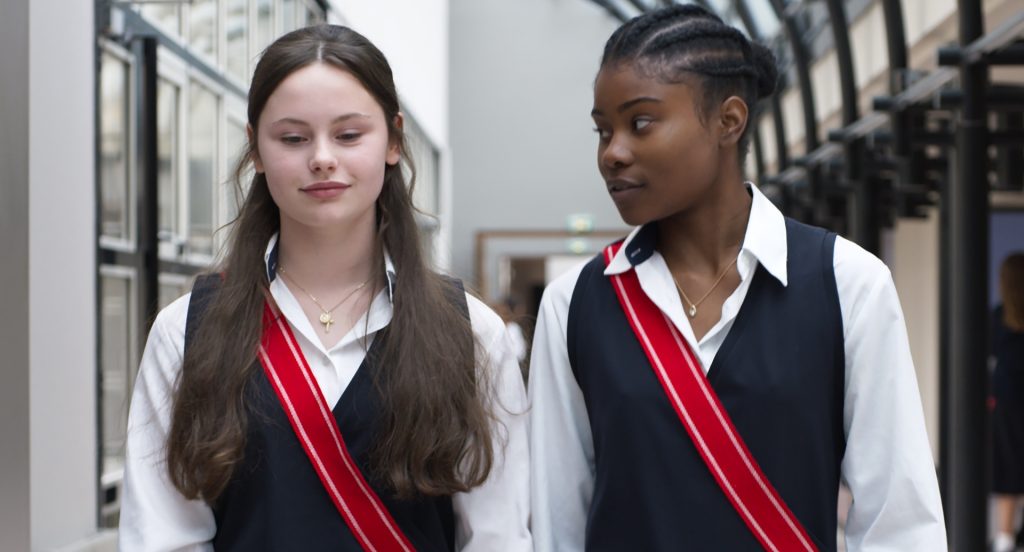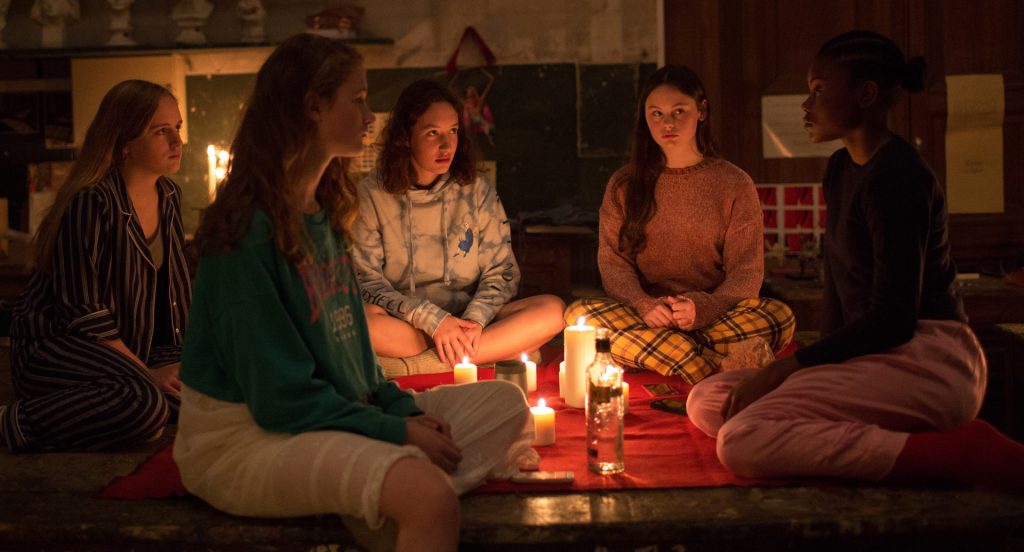Bertrand Bonello, France, Haiti, horror, Katiana Milfort, Louise Labeque, Mackenson Bijou, movies, reviews, Wislanda Louimat, Zombi Child
January 24, 2020
by Carla Hay

Directed by Bertrand Bonello
French with subtitles
Culture Representation: Set in modern-day France and 1962 Haiti, the horror film “Zombi Child” has a racially diverse cast of white and black actors who portray the upper-class and working-class.
Culture Clash: The movie shows what happens when the worlds of voodoo and zombies collide and span different generations.
Culture Audience: “Zombi Child” will appeal to people who like their horror films to be artsy and somewhat unpredictable.

Most zombie stories take place in a post-apocalyptic setting where zombies have taken over the world, so it’s refreshing when a zombie story raises the possibility that zombies could be walking among us in the current world, and they don’t have the obvious appearance of rotting, flesh-eating corpses. The French-language horror film “Zombi Child” is a moody, atmospheric and occasionally disturbing zombie story with scares that are more psychological than bloody and gory.
“Zombi Child,” written and directed by Bertrand Bonello, takes place in two different countries in two different eras: contemporary France and 1962 Haiti. The movie starts out in a deceptively “normal” and “controlled” setting: a prestigious boarding school for teenage girls. Almost all of the students are white except for a new arrival named Mélissa (played by Wislanda Louimat), a Haitian orphan whose parents died in the earthquake that devastated Haiti in 2010. Mélissa is currently living in France with her aunt Katy (played by Katiana Milfort).
As a new student, Mélissa is treated like an outsider. She doesn’t seem to mind too much about being a loner at school, and her mysterious confidence intrigues a fellow classmate named Fanny (played by Louise Labeque), who leads a clique of popular girls at the school.
Inside and outside of classes, Mélissa and Fanny strike up a tentative acquaintance. Although Fanny might look like she’s in control of her life on the outside, on the inside, she’s experiencing a lot of turmoil. In voiceovers, we hear her talking to a boyfriend, whom she says she misses terribly and can’t wait to be in his arms again. Is she reading a letter? Is she thinking about the last time she talked to him? Or is she imagining a conversation that she’s having with him?
We find out later that the boyfriend’s name is Pablo and something has happened in his relationship with Fanny that has caused her a lot of despair, to the point where she’s ready to do something extreme. Meanwhile, Fanny hides her troubles away from the people she knows and acts as if nothing is wrong with her.
Fanny eventually decides to let Mélissa into her clique, which secretly meets at night to drink alcohol and gossip in one of the empty classrooms. One night, Mélissa joins them for one of their candlelit meetings, and Fanny tells her that she can officially join the group if Mélissa tells them a secret and if they like what Mélissa tells them.
Mélissa then reads them a poem-like statement called “Captain Zombi” about African-descended zombies taking back power from white oppressors. While the other girls go in another room to decide if Mélissa can join the group, she stays inside the room and listens to music. The girls come back in the room and tell her that she’s been accepted into the group.
Fanny wants to hear more about Mélissa and her family background, so Mélissa tells them about being an orphan. Mélissa also mentions that she lives with her aunt when she’s not at the boarding school. Mélissa says that her aunt is a mambo. Later, Fanny looks up “female mambo” on the Internet and sees that it means someone who practices voodoo.
Intrigued, Fanny finds Mélissa’s address and shows up unannounced at the house of Mélissa’s aunt. She tells the aunt that she knows Mélissa from school, and so the woman lets her in the house. It’s there that Fanny makes a very unusual request.
Meanwhile, there are mysterious flashbacks to Haiti in 1962, where we see a black man named Clairvius Narcisse (played by Mackenson Bijou), who’s been sent to work at a sugar plantation. He appears to be mute and acting like a zombie. Who this man is and what happened to him are revealed in the movie.
Meanwhile, Mélissa’s roommate tells Fanny that Mélissa has been making strange grunting noises at night, and she doesn’t know if she’s making the noises while awake or in some kind of trancelike state. Mélissa is also heard making the noises while she’s in other places on campus, so it’s established that she’s definitely making the noises while she’s awake.
“Zombi Child” is not going to satisfy zombie fans who are looking for scenes of people being chased by rabid zombies. (The actual horror scenes in the film aren’t until near the end.) The movie takes an approach that being in a zombie-like state is more of a demonic spiritual possession rather than a physical transformation where people turn into monster cannibals. “Zombi Child” is an artsy horror film, but underneath the surface is a nuanced commentary on social classes and what happens when people are complacent about wrongful oppression.
Film Movement released “Zombi Child” in select U.S. cinemas on January 24, 2020. The movie was originally released in France in 2019.
